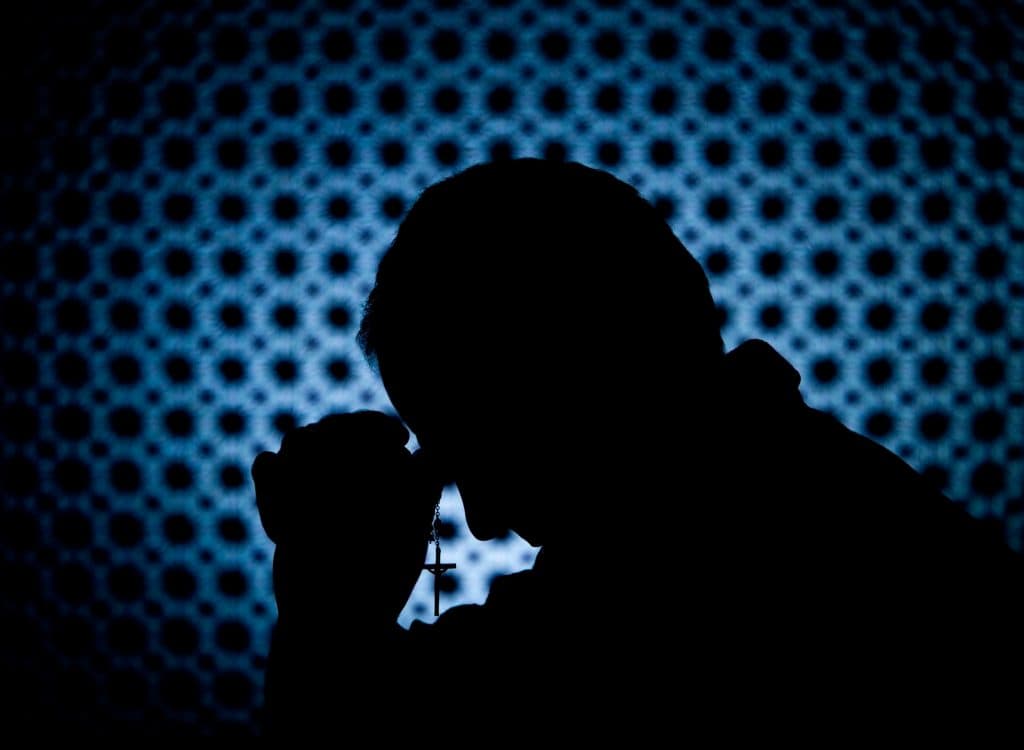Many of us tend to think we feel shame in response to using pornography. What might surprise you however is that the reverse is also true.
The more we feel shame, the more we will be drawn to use pornography.
Why? Shame drives us to behaviors that reinforce the judgment we hold against ourselves. Whatever your judgment is, you will inevitably pursue behaviors that provide evidence to confirm that core belief.
Let me show you how.
Dough
In graduate school, I lived with a housemate who worked the closing shift at our local Starbucks. It was a diabolical gift. After work he would walk into our home with a bounty of free day-old pastries. Our kitchen counter would become a stadium of blueberry and pumpkin scones, old-fashioned and chocolate doughnuts, cinnamon rolls, molasses cookies, and the most alluring of all: the apple fritter. On evenings when I would get home late after a particularly difficult day, I’d hear the baked goods whisper to me, telling me to put them in the microwave for sixteen seconds and lavishly drizzle white chocolate sauce on top.
The next morning, I would wake and, unsurprisingly, despise myself. The whole day, a fried mass of sugar from the night before would hold me in contempt the following day. I’d see my belly folded over my jeans and blush at the prospect of others seeing my weight and, therefore, an appetite I had condemned. In my self-hatred, I’d hide in a coffee shop and study until it was late enough for my housemates to be in bed. After a day of shame and shame avoidance, I’d look to pastries not only for comfort but also to set up another day of judgment. It was during these days of intense judgment against myself that I would be most drawn to use pornography. When we feel terrible about who we are, we pursue behaviors that provide irrefutable evidence that we are unwanted.
Unfortunately for me, this carbohydrate ritual of consumption, shame, and self-hatred had been going on for more than a decade. If my carbohydrate episodes were a television show, there would be a flashback to my thirteen-year-old self, an obese eighth grader in the suburbs of Washington, DC, belly bulging over discount jeans, about to fail algebra, and whose bus stop nickname was Doughnut. I was, as my bus stop peers would say, “too fat to even play football.” At the bus stop, several middle schoolers would laugh as one peer poked my belly, making the noise of the Pillsbury Doughboy. In the evenings, I would echo and intensify their contempt, eating sweet dough and shaking my stomach like a doormat.
What was happening in graduate school was a repetition of the shame that I underwent in middle school. The way I used food simultaneously gave me escape from shame, but in the end, reinforced it.
The Face of Shame
As a counselor, I often have a front row seat to the debilitating nature of shame. When people talk to me about their use of pornography and the specifics of what they search for on the internet, they fight to keep shame from fully possessing them.
They avoid eye contact, fail to finish their sentences, and become extremely evasive of questions and vague in their answers. Sometimes they even stop talking altogether. Their faces become red, their eyes search in hypervigilance, and if the experience intensifies, their bodies hunch over, their heads droop, and they bury their faces in their hands.
Shame is primarily concerned with the eyes or the perceived gaze of someone seeing our unwanted behavior. Shame makes us want to hide. It tells us that something about us is beyond repair or intrinsically foul and we would be better off unseen. Our discomfort is unbearable. All we can do is run from how widespread our problems seem to be.
For those of us who have struggled with pornography, shame is an all-too-familiar companion. Given this, it might seem unnecessary to point out the relationship between shame and pornography. Surely, feeling unworthy after having done something sexually that violates our core values is a fairly straightforward affair: we’ve done something wrong and now we feel ashamed of it.
However, when we look more closely at the relationship between shame and pornography use, something surprising comes to light: our shame isn’t simply a natural consequence of viewing pornography; it’s also a key driver propelling us to it.
According to the data from my research, men were almost 300 times more likely to seek out pornography for every unit of shame they felt about such behavior. For women, the numbers were almost double, with those in my sample being 546 times as likely to do so. It must be said that shame, not pleasure, drives pornography use.
Related: Who Watches Porn? 3 Key Predictors of Porn Use
What Story Does Shame Tell About You?
At some point in our lives, we will have to engage the stories that shame tells about us. Do you believe you are not good enough? Too insecure? Too awkward? Too stupid? An intrusion? Whatever your core belief about yourself is, be on alert for how you will manufacture evidence to confirm that belief. Embedded within your shame are clues into the stories that convinced you that you were unwanted in the first place. Those stories, not the shame of pornography use, are the most crucial to address if you desire wholeness.
The next time you feel shame about your latest pornography consumption, I invite you to go deeper into what exactly you believe about yourself. Let me show you three brief examples of how a core belief shapes your experience of shame.
Let’s say your core belief is “I am unlovable.” Your shame will tell you that if someone got to know the real you, he or she would not love you.
If your core belief is “I am insignificant,” your shame might tell you that you look at porn as a consolation because no real romantic partner would ever be interested in someone like you.
Or if you believe, “I am screwed up,” because you were aroused by something you thought you shouldn’t have been aroused by, your shame will use your latest escalation in pornographic themes as evidence of how messed up you are. Pornography use is just the icing on the cake of shame.
Facing Shame
Now that we’ve established that shame drives pornography use, how do we begin to reduce its power? Believe it or not, the Discovery Channel’s Shark Week holds a clue for how we can disarm and, eventually, overcome our unwanted sexual behavior.
In my book Unwanted: How Sexual Brokenness Reveals Our way to Healing, I discuss an interview with Andy Casagrande, the cameraman responsible for the harrowing and death-defying footage of aggressive and large great white sharks. Casagrande was asked what in the world he does when one of these behemoths is swimming right at him.
His surprising answer was that he has to do something completely unexpected: swim straight for the shark with his camera. Swimming toward the shark seems to trigger an instinctual defensive reaction in the sharks. According to Casagrande, “The reality is that if you don’t act like prey, they won’t treat you like prey.”
So what does swimming with terrifying sharks have to do with our shame? Simply this: we need to face it.
The experience of shame is the apex predator of our lives, and our impulse to evade our “great white” memories will only set us up for lifetimes of living as prey to shame’s accusations. Just as a shark swims away when challenged, the power of shame is disarmed when we confront it, not flee from it. To be sure, shame is a merciless beast, but every time we consciously choose not to behave as its prey, it becomes less powerful.
Related: What Your Sexual Fantasies (Might) Say About You
Looking at Our Suffering
In Numbers 21, the Israelites are homeless and wandering about in the wilderness. They have no choice in their lodging accommodations and depend on air-dropped rations from above. Naturally, a number of them begin grumbling and complaining about their situation. Soon enough they were openly speaking against Moses and God for having delivered them into such a mess.
In the next scene, the people of Israel’s situation becomes more dire as poisonous snakes begin killing people. In their horror and desperation, the Israelites recognize that their slanderous speech about God may have been the very thing that led to the nightmare they find themselves in. Having heard their pleas for deliverance, Moses petitions God on behalf of the people of Israel.
God’s answer to their prayers was both simple and almost comical: He had the people fashion a bronze snake, fix it to a pole, and have all of those poisoned by the venomous serpents look at it. The allegorical significance is pretty clear: the people of Israel must look at the very thing that is killing them. We will be healed to the extent to which we turn and face the stories that corner us with shame.
Disarming Shame
The core beliefs we hold about ourselves in our shame (those toxic beliefs that we’re not worthy of love or belonging) are not random. They are direct reflections of the stories we’ve encountered in life.
When I was first intentionally addressing my problems with pornography, I realized that my core belief was that my desires were defective and untrustworthy. After all, my desire was the very thing that led me to obesity and pornography. I concluded that the solution was somehow to lessen my desire in order to mitigate future damage.
But when I went back to the stories of my desire from childhood, I saw a six-year-old boy who used to get so excited about a barbecue that he’d have a bowel movement and bellow out songs about his love for hamburgers from the toilet. I saw a kid with a beautiful desire to learn about sex and pleasure against the backdrop of a family and religious community that was almost completely silent.
Healing was not about arresting desire but about setting it free. At times, our shame certainly exposes our failures, but it can also reveal the things that are the most beautiful about us.
One day of deliberately facing your shame with curiosity and kindness will lead you into greater transformation than will a decade of willpower and lust management techniques. If self-hatred is the key driver of unwanted pornography use, kindness is its kryptonite. Shame does not need to have the last word. It can actually be the very experience that invites you to dramatically reorient your life around kindness. When you change your unhealthy patterns of interacting with your shame, your behavior will change.
In the Gospel of John, the story of the Moses raising the bronze serpent is revisited. This time, it is Jesus who is placed on a wooden pole and we must look at him in order to be saved. When we face our heartache and face the one who bears the curse of shame on our behalf, we find the healing we’ve been longing our whole life to find. Shame is not a barrier, but a bridge to redemption.
For Reflection
- What is your core shameful belief about yourself?
- What stories are connected to this belief?
- Recall a time where being ashamed of yourself drove you to viewing pornography.
- What sexual behavior or fantasy do you find the most difficult to extend kindness to?
Resources for Your Journey
- Jay’s new book, Unwanted: How Sexual Brokenness Reveals Our Way To Healing
- The Unwanted Sexual Behavior Self-Assessment. This cutting edge self-assessment is designed to show you how your life story shapes your sexual brokenness.
- Journey into the Heart of Man. This 18-episode recovery resource is a collaboration between Jay Stringer, The Heart of Man film, and Covenant Eyes. Through nearly 10 hours of video content, in-depth assignments, and the Unwanted Sexual Behavior self-assessment, this resource guides men and women to the journey to freedom from unwanted sexual behavior.










I turned 36 last December. Everyone in my tight close knit circle of family and friends have started asking me when I am going to get married. The one thing they fail to realise is that marriage is getting more likely to be a probability for me than a possibility. I am still a virgin in every sense of the word physically. Mentally, I am not. I have had fantasies for as long as I can remember. Even before I had my first glimpse of hardcore pornography at 14, I was already having sexual fantasies. I barely feel ashamed of my porn use these days because I tend to inwardly justify same because of my status as a virgin. The only kiss I have ever had was at the age of 8 during a wedding rehearsal for my aunt’s wedding. That memory is still fresh in my mind. I put on a mask these days that it is so hard for anyone to know me really. This is not helped by the fact that I am introverted and have been so way before I even hit puberty. My life is test.
Thanx for the article. I honestly didn’t read every single word tho, but I got the jist of it. I think I’m honestly just replying because I so badly need help, alot of times I feel like a lost cause. I’ve been addicted to PMO way before Covenant Eyes ever existed, way before any research,statistics, sites on PMO addiction were created. I’ve been addicted for like 30yrs… That’s more than half my life! I’ve only known what life is like not being addicted from 13yrs old going back, all the yrs after 13… I always was addicted. I would like to install covenant eyes for my phone, but I don’t know if it’s gonna work, & I think part of me has a tough time letting go. I hear stories of people struggling with this addiction (like NO FAP etc., )…. But I’ve never heard of nobody struggling as long as me. It also doesn’t help that I don’t have a partner (wife,girlfriend,friend wit benefits etc., )… That’s one of the core reasons I keep relapsing! Cuz I have nobody… It’s like how long do you hold-out? When u don’t have nobody! And the last person I had, I was really into her! The crazy thing is…eventho it was rocky at times. I actually stopped PMO-ing when I was dealing with her! Cuz I kinda had no reason to PMO cuz I had a sex partner so to speak. And nah I didn’t look at the girl like she was just a sex-object, I actually liked the girl! So when I didn’t have the girl, plus the domino effect, it totally destroyed me. I know you guys probably heard a million stories like this, but I feel like my story is different, cuz I’ve been a slave to this for soooo long! It almost feels like it’s kinda demonic or like a set-up etc.,…. I don’t know….smh, I didn’t even plan on texting so much… But I just decided to vent, I’m very chronic, and I seriously need effective help, I feel like my whole man life is being destroyed, all the while living in a society that doesn’t give a damn about my problem, doesn’t care, doesn’t relate to it at all, & doesn’t consider it serious at all, probably finds it comical etc., ….But it’s definitely not a joke, and I believe it’s the toughest addiction far more tougher than any addiction in the history of life!
Hi Maxwell,
Have you reached out to a close friend or mentor about this? I have found that with any struggle in life, it is extremely difficult to overcome it alone. I want to encourage you to reach out to someone you trust and ask them to hold you accountable. This can be through daily texts, weekly meetings for coffee, and/or using Covenant Eyes Screen Accountability together.
Please do not give up! You are not alone in this struggle. Porn addiction is incredibly difficult to overcome, and many are in the same fight as you!
I am praying for you.
Moriah
Thanks for great food for thought. I think the harm coming from shame unaddressed like that will indeed cause further damage in many forms. Porn is one, unhealthy eating is another, but the damage can come out in other ways too, even stress and its physical manifestations, potentially debilitating if not fatal.
Excellent article, Jay. Really well written, insightful and true. I’d add one thing though: you stated, “If self-hatred is the key driver of unwanted pornography use, kindness is its kryptonite.” I agree, but it’s not enough to be kind to myself (I interpret that as curbing the shame-fueled, self loathing and critical inner monologue), rather I have found NO greater kindness than from confession to other believers. When they receive me and pray for me, truly a flood of grace comes over me and I realize I’m not alone, I’m loved and accepted even as I am sinful and broken and that shame truly was a liar. If shame is a lie that says, “I need to run away and hide so no one can look at me,” then to swim directly toward the shark is to go to another person and say, “this is who I truly am; I’m struggling.” It won’t “feel” right but God’s word (1 John 1:7-9; James 5:16) and the experience of thousands of men and women I have witnessed attest that it is truly a freeing experience.
Thanks for writing this and sharing. Best wishes on your book!
Can you provide more detail on what you mean by and how to face shame with curiosity and kindness. Examples of applying this principle. Thanks.
Excellent article Jay. Thank you for continuing to direct us to focus, not on our behavior, but on what is beneath the behavior and ultimately driving us to issues like pornography. Highly recommend your book.
Jay
Thank you so much for addressing this issue in your article. It gave me biblical wisdom on dealing with my struggles on pornography and masturbation. It is a shameful act I have struggled with since high school. Your article forced me to examine why this is a daily struggle when I get down on myself. Thank you for helping me to refocus my attention on Jesus and his unfailing love and mercy for me
I agree wholeheartedly with this article on shame. Thank you for producing this and all the other resources. I am a Pastor and oversee a counseling department. One of our areas of focus is addictive recovery. In addition, I suffer a long time monthly desire to look at pornographic images. Before eradicating the shame cycle it became a binge, shame, expose-it, suffer the shame of peers, white knuckle, and a few weeks of success kind of pattern. Since connecting with groups like Avenue, it is no longer as compelling. I still feel drawn to porn when I feel undervalued or diminished. What is interesting to me is that my temptation, followed by the scheming process and then eventually, on occasion (25%+/-), I will still succumb to viewing the images without “acting out”. For me, “acting out” is viewing the images and coming to climax. But I still wrestle with viewing the images and then reaching out to a committed friend (Battle Buddy) in the process. Often I choose to not reach out till the next day because I do not want to end the chemical rush I am experiencing by viewing the images at the moment. Despite the numerous safeguards, filters, and accountability structures I have, I still have the ability to bypass them all and choose to once every 3 months or so. We call it crossing boundary lines. Well, I guess I am simply writing because I know I am free from shame but I choose to re-shackle myself with these negative images. I choose to “eat the donut”. Maybe I eat half the donut and set it down real quick. It’s a cycle I am not proud of and I will continue to ask the Lord to help me remove this cycle of sensuality from my monthly, quarterly, or binge experience. But, truth be told, I sometimes wonder if I am going to break this awful habit completely. Will I always succumb to playing around the edges?! I don’t want to take the deep dive and get burned. I welcome your feedback on this note.
Friend, you’re not alone. I am thankful for this article as it has given me more insight. I, like you, have been an addict for a long time and I also understand about getting around filters and the such. I support you in your daily battle with this but the one who can ultimately deliver is Christ. As badly as I hate the addiction and have prayed countless times for it to be removed as the apostle Paul prayed for the thorn from his flesh to be removed, God had not taken this from me. I have, however, experienced glorious times of sheer freedom where has completely veiled and shielded me. Always trust in God. That’s what I try to do because it’s my only hope.
I found this very insightful, and provincial. Thank you.
Not sure I understand what you mean by the following question:
“What sexual behavior or fantasy do you find the most difficult to extend kindness to?”